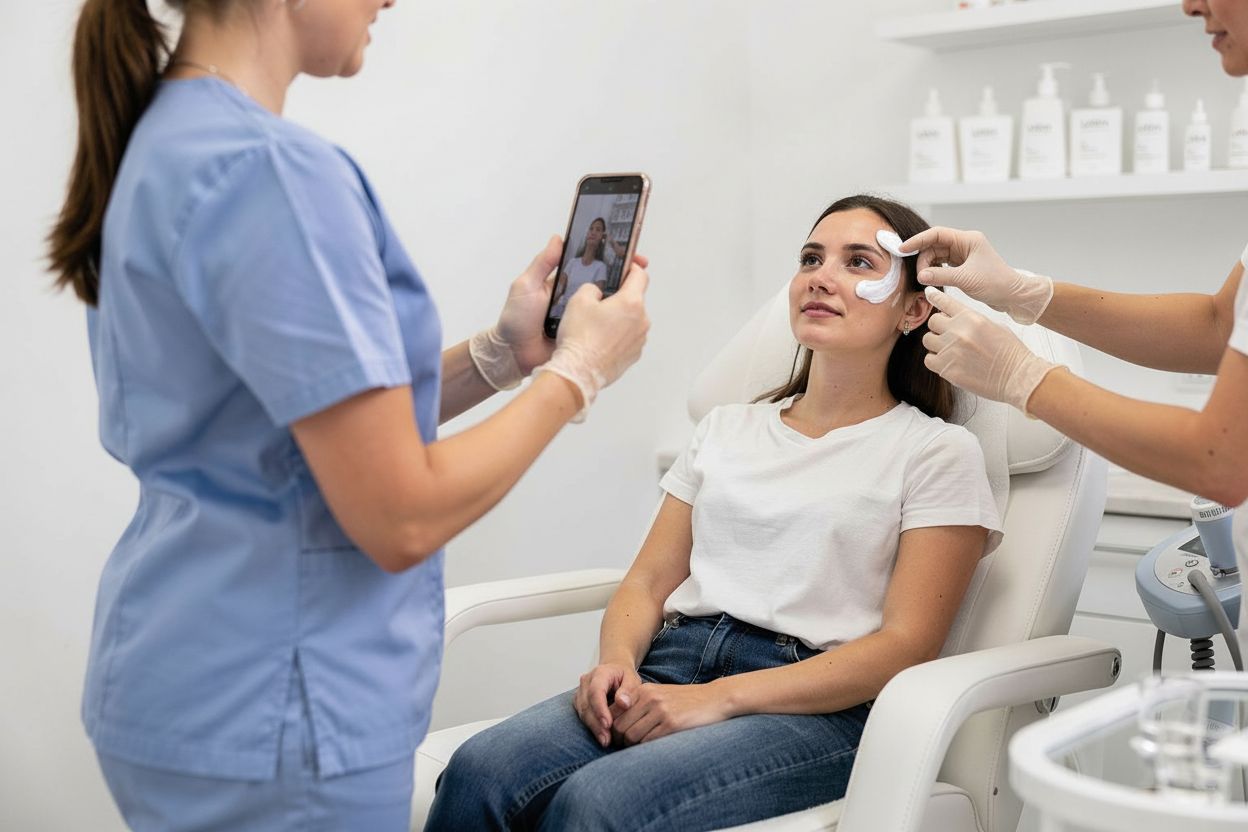Medical Spa Laws and Requirements in Maryland

Empowering Professionals at Every Stage
Portrait offers strategic expertise to help you make informed decisions and achieve long-term success.
Book Intro CallIn Maryland, a medical spa is regulated as a healthcare facility that must be owned by a physician and licensed by the state board of health. This guide will walk you through the key licensing requirements, providing the clarity you need to run your practice with confidence and ensure full compliance.
How Medical Spa Laws Work in Maryland
Understanding the medical spa laws in Maryland begins with recognizing that a med spa is classified as a medical service provider, distinct from a traditional day spa. While day spas offer non-medical cosmetic services, med spas perform medical procedures like Botox, fillers, and even treatments classified as surgical acts, such as laser hair removal. This distinction is critical because these services demand a higher level of regulatory oversight to protect patient safety.
Consequently, several state agencies create the med spa regulations that ensure med spa compliance. The Maryland Board of Physicians defines which procedures are medical, the Board of Nursing governs the scope of practice for nurses, and the Board of Health handles facility licensing. These medical spa requirements in Maryland also dictate who can own a med spa, with ownership generally restricted to state-board certified physicians.
Medical Spa Requirements in Maryland
We will cover the essential medical spa requirements in Maryland to help you operate with confidence. The state's med spa laws dictate who can open a med spa, typically restricting ownership to licensed physicians or qualified Certified Nurse Practitioners due to the corporate practice of medicine doctrine. Furthermore, maintaining med spa compliance involves appointing a resident medical director, adhering to strict supervision protocols, and confirming every procedure falls within the provider's legal scope of practice.
Medical Spa Ownership & Business Structure Requirements in Maryland
Maryland’s medical spa ownership laws are guided by the state's Corporate Practice of Medicine (CPOM) doctrine. This legal principle generally restricts who can own a med spa to licensed physicians. Consequently, corporate entities like LLCs or professional corporations cannot directly own a practice that provides medical services.
While non-physicians cannot own the medical practice, you can establish a compliant partnership using a Management Services Organization (MSO) model. The MSO structure allows a non-physician-owned company to manage all non-clinical business functions, such as marketing and administration. This approach provides a clear path for entrepreneurs to participate in the industry while adhering to med spa regulations.
A critical component of the Medical Spa Requirements in Maryland is appointing a medical director who is a licensed physician in the state. This director must be actively involved in operations, including protocol development and staff supervision, not just a figurehead. State rules strictly define how this physician can delegate procedures, which is fundamental for maintaining med spa compliance.
Facility, Licensing, and Compliance Requirements in Maryland
To operate legally, you must secure a license from the state board of health for your facility. Your local zoning agency must also provide an approved use and occupancy permit before you can open. These steps are fundamental to satisfying the initial Medical Spa Requirements in Maryland.
Your operational protocols must adhere to federal standards, as med spas are classified as medical providers. This includes full compliance with OSHA for workplace safety and HIPAA for protecting patient data and privacy. These med spa regulations are not just suggestions but firm rules for running a compliant practice.
The Medical Spa Laws in Maryland also address liability and marketing. You must carry malpractice insurance and implement a conformed consent procedure, while your advertising must prohibit false claims and disclose practitioner qualifications and risks. Proper recordkeeping in line with HIPAA is the final piece for maintaining complete med spa compliance.
Who Can Perform Medical Spa Procedures in Maryland?
The Medical Spa Laws in Maryland clearly define who can perform treatments, distinguishing between medical and cosmetic services. Only licensed healthcare professionals whose board permits the procedure may perform medical treatments like injectables and laser therapies. This is a core tenet of the state's med spa regulations, ensuring patient safety and med spa compliance.
In Maryland, only state-board certified physicians and Certified Nurse Practitioners (CNPs) are explicitly permitted to perform most med spa services, including Botox injections and dermal fillers. The use of lasers for procedures like hair removal is considered a surgical act, which can be performed by physicians, CNPs, physician assistants (PAs), and registered nurses (RNs) under specific board rulings. Aestheticians are not considered healthcare practitioners and are limited to non-medical services like facials, waxing, and dermaplaning.
Proper supervision is a critical component of the Medical Spa Requirements in Maryland. A licensed physician must serve as the medical director and be actively involved in operations, including developing protocols and overseeing staff. While a physician can delegate tasks, they can only do so to other licensed and trained healthcare providers, ensuring the medical director retains full authority over all clinical decisions and avoids non-compliant "silent" arrangements.
Laser & Energy Device Regulations in Maryland
The Medical Spa Laws in Maryland classify the use of lasers for procedures like hair removal as a surgical act, placing them under strict med spa regulations. Consequently, only specific licensed healthcare providers—including physicians, certified nurse practitioners, physician assistants, and registered nurses—may operate them. A licensed physician must delegate these tasks and actively supervise all clinical operations to ensure med spa compliance.
While specific training details are not fully outlined in many med spa laws by state, the Medical Spa Requirements Maryland mandate that any delegated provider receive training in accordance with its regulations. These rules for lasers are also understood to apply to other cosmetic medical devices, though devices like IPL and radiofrequency are not explicitly named. Adhering to these standards is essential for your practice to operate compliantly in Spas in Maryland.
Medical Spa Enforcement, Penalties & Risk Management in Maryland
Operating successful Spas in Maryland requires a firm grasp of the state’s enforcement actions and penalties. Violating the Medical Spa Laws in Maryland is not a minor misstep; it can lead to severe consequences that jeopardize your practice, finances, and professional licenses. Understanding these risks is the first step toward building a resilient and compliant business.
If your practice fails to meet state requirements, enforcement actions can be swift and damaging. The Maryland Board of Physicians and other regulatory bodies may issue cease-and-desist orders, forcing you to halt operations immediately. They can also impose significant fines and pursue disciplinary action against licensed professionals, including suspension or revocation of licenses. These penalties underscore the importance of adhering to all med spa regulations.
Many compliance issues arise from common, avoidable mistakes. These often include improper delegation of medical tasks to unqualified staff, running advertisements with misleading claims, or violating the rules around who can own a med spa. These errors directly contradict the Medical Spa Requirements Maryland and can be interpreted as unlicensed practice, which carries some of the heaviest penalties. While med spa laws by state vary, Maryland is rigorous in its oversight.
To help you maintain med spa compliance and protect your business, here are some essential risk management practices:
- Conduct regular internal audits to review your protocols, documentation, and procedures against current med spa regulations.
- Implement ongoing staff training on scope of practice, patient privacy, safety standards, and proper equipment use.
- Maintain meticulous records of patient consents, delegated procedures, supervision logs, and staff credentials and training.
Stay Compliant with Portrait Care in Maryland
Operating a compliant medical spa in Maryland requires careful attention to physician ownership rules, facility licensing, and strict supervision protocols. As we've covered, only qualified medical professionals can perform procedures, and a licensed physician must serve as the medical director to oversee all clinical activities.
Please remember, this guide is for informational purposes only and does not constitute legal advice. We strongly encourage you to consult with a qualified healthcare attorney to address your specific circumstances.
At Portrait Care, we provide the technology, services, and support to help you run a compliant and successful practice. Our all-in-one platform gives you the tools and resources needed for safety and operational excellence. You can learn more about opening a compliant med spa with our detailed guides. See how our platform can support your business from launch to long-term growth by scheduling a demo with us today.
One Platform.
Everything You Need.
Everything You Need.
Portrait combines the technology, support, and savings to run and scale your modern medical wellness business.
Book Intro Call
Stay Connected with Portrait Care
Subscribe to our email list and receive the latest insights, updates, and exclusive content delivered straight to your inbox.




![Who Can Own a Medical Spa? [State by State Guide]](https://cdn.prod.website-files.com/67981e0672f9e49c5b9cb890/69869b11472946b6ec9fe1f0_1770427418079.jpeg)
